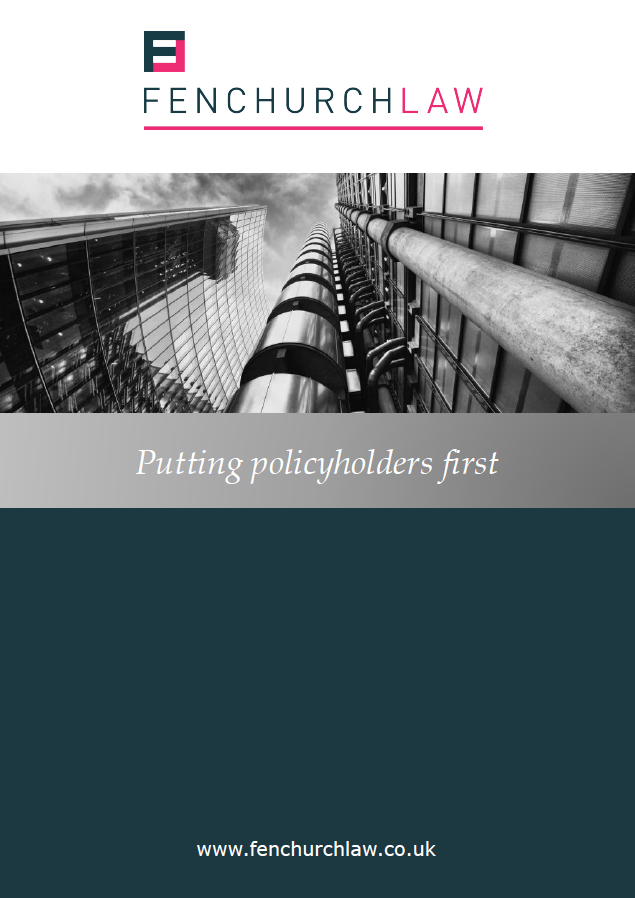
Covid “Catastrophe” Triggers BI Reinsurance
The first UK court ruling on the reinsurance of Covid-19 losses has confirmed coverage under excess of loss policies taken out by Covéa Insurance plc (“Covéa”) and Markel International Insurance Co Ltd (“Markel”). Mr Justice Foxton allowed recovery against reinsurers for losses occurring while the underlying policyholders were unable to use their business premises, due to government restrictions, on the basis that the pandemic was a “catastrophe” within the meaning of the reinsurance contracts.
Covéa and Markel paid out a combined total of over £100 million to policyholders for Covid-19 business interruption (“BI”) losses and made claims under their respective reinsurances with UnipolRe Designated Activity Company and General Reinsurance AG. Disagreements arose concerning the scope of cover under the reinsurance contracts, and a consolidated judgment was given in two separate appeals under s.69 of the Arbitration Act 1996, against arbitration awards dated January and July 2023. In summary, the appeals raised the following issues:
- Whether the relevant Covid-19 losses arose out of and were directly occasioned by one catastrophe on the proper construction of the reinsurances. Both arbitration awards found that they did; and
- Whether the respective Hours Clauses in the reinsurances, which confined the right to indemnity to “individual losses” within a set period, meant that the reinsurances only responded to payment in respect of the closure of insured premises during the stipulated period. The Markel arbitral tribunal found that the relevant provision did have that effect, while the tribunal in the Covéa arbitration found that it did not.
The Judge found in favour of the reinsureds on both issues.
Loss Arising from One Catastrophe
Coincidentally, both Covéa’s and Markel’s losses arose through direct insurance of nurseries and childcare facilities, which had been forced to close from 20 March 2020 by the UK government’s Order of 18 March 2020. The reinsurance contracts contained similarly worded Hours Clauses based on the LPO 98 market wording, including a form of aggregation provision operating by reference to a specified number of hours’ cover for any “Event” or “Loss Occurrence” (terms previously held to have the same meaning), defined as “all individual losses arising out of and directly occasioned by one catastrophe”.
For any Event or Loss Occurrence “of whatsoever nature” which did not include losses arising from specified perils (such as hurricane, earthquake, riot or flood) listed in the Hours Clauses, the limit was 168 hours (i.e. 7 days). Infectious disease was not a named peril and the 168 hours limit applied.
In circumstances where the arbitral awards were based on mixed findings of fact and law, it was common ground that the court could not interfere on a s.69 appeal unless the arbitral tribunal either had erred in law or, correctly applying the relevant law, had reached a decision on the facts which no reasonable person could have done.
On general principles of construction, the Judge endorsed the comments of Mr Justice Butcher in Stonegate v MS Amlin [2022] that “in considering whether there has been a relevant ‘occurrence’, the matter is to be scrutinised from the point of view of an informed observer placed in the position of the insured” (per Rix J. in Kuwait Airways [1996]).
Reinsurers argued that the gradual unfolding of the pandemic did not qualify as a “catastrophe” under the reinsurance policies, taking account of the historical development of property excess of loss market wordings, which was said to implicitly demonstrate the requirement for a sudden and violent event or happening, which could not be established on the underlying facts. Further, reinsurers claimed that a catastrophe is a species of occurrence or event that must satisfy the “unities” of time, manner and place, applied by Lord Mustill in Axa v Field [1996].
The Judge concluded that terms of the reinsurance contracts supported a generous application of the unities test, given the requirements for losses under multiple policies, with a duration potentially exceeding 504 hours (the period specified in relation to flood perils, i.e. 21 days), within broad geographical limits, indicating that a covered catastrophe could have a potentially wide field of impact.
While acknowledging the difficulties inherent in distinguishing between a “catastrophe” properly so-called, as an appropriate basis for aggregation, and a series of discrete losses sharing some common point of ancestry, the Judge held for purposes of the reinsurance claims under consideration that a catastrophe:
- Must be capable of directly causing individual losses, likely in most cases to exclude “states of affairs”.
- Is a coherent, particular and readily identifiable happening, with an existence, identity and “catastrophic” character arising from more than the mere fact that substantial losses have occurred.
- Will be identifiable, in a broad sense, as to its time of coming into existence and of ceasing in effect.
- Involves an adverse change on a significant scale from that which proceeded it.
Applying these principles to the findings in each award, the Judge noted that both tribunals had referred to the outbreak of Covid-19, and the resulting disruption of life in the UK, leading up to and necessitating the 18 March Order, as a catastrophe. In circumstances where the various government directives, including the 18 March Order, were rational and considered measures taken in the public interest, it was not necessary to explore the issue of whether a government order in isolation could be viewed as a catastrophe, since “the pandemic and the response thereto could not be disentangled”, an approach consistent with the decisions in Star Entertainment v Chubb Insurance Australia [2021] and Gatwick Investment v Liberty Mutual [2024].
Interpretation of the Hours Clauses
Covéa and Markel argued that all BI losses arising from the 18 March Order were reinsured, notwithstanding the BI losses continuing after expiry of the 168 hour period. The Covéa arbitral award endorsed this approach, determining that the reference to “individual loss” meant “a loss sustained by an original insured which occurs as and when a covered peril strikes or affects insured premises or property”. However, the Markel tribunal found in favour of the reinsurer, reasoning that it was “natural to think that BI losses occur day by day”, and therefore construing the relevant words as not “dealing with causation but with the occurrence of a particular loss”, since the “subject matter of an ‘Event’, its duration and extent, and its occurrence, are all referenced to losses not perils.”
The effect of the Markel tribunal’s finding was that only 168 hours of BI losses could be recovered from the reinsurer (although the BI had in fact extended until at least June 2020, when the relevant restrictions were first lifted), so that most losses fell outside the scope of cover and Markel was unable to reach the specified attachment point under the reinsurance policy.
In reconsidering this issue on appeal, the Judge was not persuaded that a clear line could be drawn between damage and non-damage BI, as contended by reinsurers, since even the former might continue to manifest after the specified hours period, for example by damage worsening over time. Further, the Court concluded that the “wait and see” analysis applied by the Markel tribunal, premised on the occurrence of BI losses on a day-by-day basis, may lead to “uncommercial consequences” and does not sit easily with the findings in Stonegate and Various Eateries v Allianz [2022], which treated the closure orders as having immediate impact on the insured property with continuous effect, analogous to physical damage to buildings; or with the Supreme Court’s decision in FCA v Arch [2021], which suggested that the correct causal sequence for non-damage BI approximates that of damage-related BI.
The Court therefore dismissed the reinsurers’ appeals as to the meaning of “catastrophe” and allowed Markel’s appeal against the conclusion of the arbitral tribunal as to the effect of the Hours Clause.
Practical Implications
Figures published by the Financial Conduct Authority in March 2023 indicate that, since conclusion of the Test Case in 2021, insurers have paid around £1.4 billion in BI claims. The Commercial Court’s decision in this case provides comfort for cedants with ongoing recoveries, significantly restricting reinsurers’ ability to challenge the presentation of Covid-19 losses under similarly worded excess of loss property policies. It will be interesting to see how the decision may be applied in subsequent cases involving aggregation of losses across multiple jurisdictions. Given that reinsurance contracts typically provide for resolution of disputes by way of (confidential) arbitration proceedings, this clear judgment in favour of the cedants is particularly illuminating.
UnipolSai Assicurazioni SPA v Covea Insurance PLC [2024] EWHC 253
Amy Lacey is a Partner at Fenchurch Law
Other news
Timing is everything – Makin v QBE and the cost of not complying with a condition precedent
3 July 2025
This recent decision from the High Court provides a powerful reminder of the consequences of not complying with a…
You may also be interested in:
Archives
Categories
- Fenchurch Law Webinars
- Stonegate
- Newsletter
- Events
- Webinars
- Comparing German and English Insurance Law – A Series
- Construction Risks
- Operations
- Business Development
- Construction & Property Risks
- News
- International Risks
- Legislation
- Financial & Professional Risks
- Case Law
- Professional Risks
- Press Release
- Uncategorized
- The Good, the Bad and the Ugly



